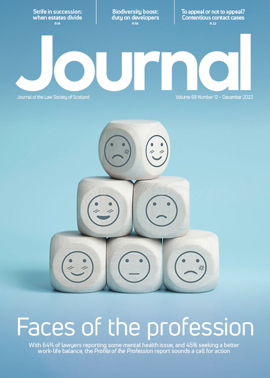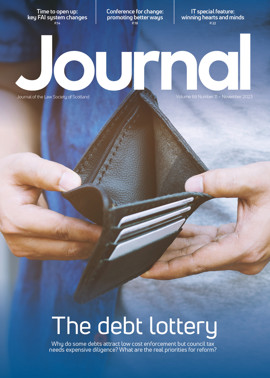Islamic finance: a Scottish lead?

Back in December 2005 I contributed an article to the Journal (“Unveiling the Islamic mortgage”), explaining some of the background to the appearance of the first Shari’a-compliant mortgage in the Scottish market. Since that time matters have moved on to a point where a follow-up seems timely.
While certainly not immune from the general recessionary malaise, at a global level Islamic finance and financial institutions have continued to expand at near-exponential rates. It has been estimated that the total assets under Islamic management worldwide currently amount to something in the range of $700-800 billion. Within the UK the sector has moved on to the extent that we now have a total of five stand-alone Islamic banks (one retail and four wholesale) registered with the FSA, in addition to Islamic divisions (or “windows” as they are known) within mainstream banks. Most recently, a Shari’a-compliant insurance provider has also appeared.
For any financial product or structure to be considered Shari’a-compliant, it must first be certified as such by an appropriately qualified Islamic scholar. Indeed one brake on development is that in practice there are very few individuals who have the necessary level of knowledge of both the Shari’a framework and the complex offerings of the modern commercial/financial world. The interaction between these two spheres is an ongoing process, and the interpretation of the requirements of Shari’a – which is very much a matter of the application of broad principles rather than detailed rules – continues to develop and become more nuanced as the sector as a whole expands and further Islamic finance products appear. There is an inevitable process of refinement, therefore, as the interaction between the requirements of Shari’a and a particular system of domestic law continues to grow, and this is proving to be the case in Scotland.
Commercial context
A fundamental principle of Islamic finance is that both the funder and the “borrower” should have a stake in the underlying asset, and in some form share the attendant risk. As I mentioned in my previous article, in terms of practical application Islamic mortgage products in England have generally followed what may broadly be described as a sale and leaseback format. This approach is not practicable in a Scottish context for a number of reasons, not least the effective prohibition on residential leases in excess of 20 years.
The initial Scottish solution therefore adopted what in Shari’a terms is known as a “musharaka” or joint venture structure, under which the funder and the “borrower” take title to the property jointly (in proportion to their initial contributions to the price), with the “borrower” buying out the interest of the funder over the term of the mortgage arrangement.
While this approach works well in principle (and has done so in practice) in the context of residential mortgages for owner occupiers, it is less easily adapted to commercial or investment arrangements. In addition to the general lack of flexibility in the structure, the funder’s role as co-proprietor can expose it to unwelcome potential liabilities in for example a leasing context. As a result of these challenges we have been continuing to explore potential alternative structures, both with potential product providers and Islamic scholars.
Trusted solution
A significant development has been the recognition that, from a Shari’a perspective, the beneficial interest in an asset is of greater significance than the formal legal title. In other words, the musharaka concept of a shared interest in property and its related risks can be established between parties as co-beneficiaries just as well as co-proprietors. The acceptance of this principle by recognised Shari’a scholars has therefore opened the way for an alternative approach to mortgage funding under which the respective interests of the funder and the purchaser of the property are governed by a trust.
The first Scottish mortgage using this structure was in fact launched in April of this year by the Islamic Bank of Britain, the retail bank among the UK Islamic finance institutions mentioned above – a significant commitment in the context of the current mortgage market. Our firm has undertaken the development of this product, in consultation with the bank’s own advisory panel of Shari’a scholars, and the outcome has been a mortgage structure under which the “borrower” retains the title to the property throughout the funding term (as in a conventional mortgage), but as a trustee under the trust structure which governs the parties’ beneficial interests.
As with the earlier structure, the “borrower” acquires the interest of the funder on an instalment basis over the course of the term. While this naturally involves additional documentation as compared to conventional mortgage finance, it does offer a considerable degree of flexibility and in our view could open the way to Shari’a-compliant property funding in non-residential contexts, such as property investment or social housing.
One of the Shari’a scholars involved in the review process commented that he considered this approach closer to the underlying spirit of Islamic finance than the models currently available under English law. This perhaps points up a rather wider aspect. In a world starved of liquidity by the continuing turmoil in the conventional financial world, the potential importance of Islamic finance (and the oil-rich countries of the Gulf in particular) has increased significantly. The UK has established a lead within Europe as the hub for Islamic finance, and there is no reason why Scotland and Scots law should not secure a significant role within this.
Graham Burnside is a partner of Tods Murray LLP and heads its banking department. He is a member of the Executive Board of the Islamic Finance Council UK
In this issue
- Planning's big day
- Hair alcohol tests: tackling the root of the problem
- Ask not...
- Trainee recruitment must be more open
- Honest talking
- Out, but not down
- A budget to save the world?
- Uncertain rights
- Copycats: nine lives used up?
- A break from illness?
- On the record
- From the Brussels Office
- Member support: the next level
- Legal practice reinvented
- Beat the pandemic
- Ask Ash
- A vintage problem?
- Final is still final
- Blacklisting blacklists
- A better fitting kilt
- Proper restraint
- Scottish Solicitors' Discipline Tribunal
- Website review
- Book reviews
- Knowledge rules OK?
- Lifting the stones
- Legitimate finding or mortgage fraud?
- Islamic finance: a Scottish lead?
- Environmental Law Centre: taking issues






